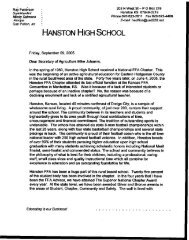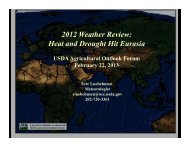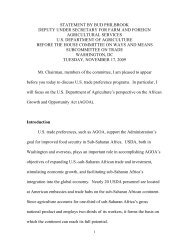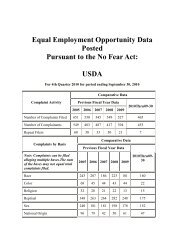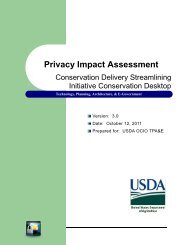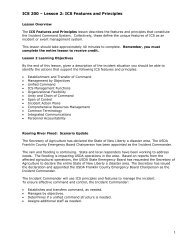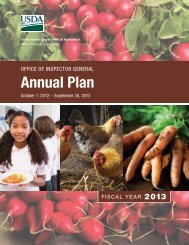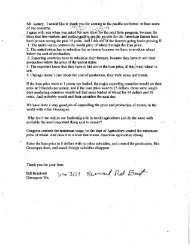USDA 2007 Farm Bill Proposals - US Department of Agriculture
USDA 2007 Farm Bill Proposals - US Department of Agriculture
USDA 2007 Farm Bill Proposals - US Department of Agriculture
You also want an ePaper? Increase the reach of your titles
YUMPU automatically turns print PDFs into web optimized ePapers that Google loves.
SUMMARY OF COMMODITY TITLE REFORMRecommendations In BriefReform farm policy to make it more market-oriented, more predictable, less market distortingand better able to withstand challenge.ProblemLoan deficiency payments and counter-cyclical payments are designed to provide producers asafety net. However, under the 2002 farm bill, loan deficiency and counter-cyclical paymentswere largest during years <strong>of</strong> record-breaking harvests and record farm income. Yet in these sameyears, natural disasters that caused complete crop loss <strong>of</strong>ten left some producers with little safetynet whatsoever. John from Kansas described during a <strong><strong>US</strong>DA</strong> <strong>Farm</strong> <strong>Bill</strong> Forum how he ended upwith no support under the current system. He said, “We didn't raise anything because <strong>of</strong> thedrought. Prices went up and we didn't get any payment. We didn't have anything to sell.” Thecurrent price-based programs tend to “under-compensate when yields decline and overcompensatewhen yields increase.”Additionally, these payments are being scrutinized by some trading partners who believe they aretrade-distorting. In fact, some farm bill programs have already been found noncompliant withinternational obligations. Further, the U.S. classification <strong>of</strong> some payments as non-tradedistorting (“green box”) is being questioned. With the expiration <strong>of</strong> the peace clause in theUruguay Round Agreement, under which domestic support measures were generally, but notfully, protected from challenge, international competitors have already begun to challenge otherU.S. commodity programs.The 2002 farm bill set loan rates at fixed levels significantly above market prices year after yearfor many crops. Some claim that these high loan rates encourage farmers to plant more <strong>of</strong> thesecrops - further increasing supply and thus decreasing prices. These payments can also encourageattempts to produce crops in environmentally-sensitive, drought-prone lands. Furthermore,farmers can take advantage <strong>of</strong> short-term market events (such as an export terminal closing dueto a hurricane) to lock-in artificially high loan deficiency payments, while actually selling thecommodity later at prices well above the loan rate. This allows the market price received,combined with the loan deficiency payment, to far exceed the intended loan rate protection.Payment limits and the Adjusted Gross Income cap have affected few producers. Only ninepercent <strong>of</strong> all farms collect 54 percent <strong>of</strong> all government commodity payments. The complexity<strong>of</strong> the law allows virtually unlimited payments to the nation’s largest and most wealthy farms.During <strong>Farm</strong> <strong>Bill</strong> Forums, producers spoke <strong>of</strong>ten about these wealthier farms inflating cashrental rates and outbidding their neighbors for farm real estate. The nation’s tax policy coupledwith these unlimited government payments have contributed to the surge in high land values andhigh rental rates. As a result, it is more difficult for beginning farmers to get started and forsmall-l and medium-sized farmers to compete.During <strong><strong>US</strong>DA</strong> <strong>Farm</strong> <strong>Bill</strong> Forums, opinions varied about the commodity title, but many werecalling for a change from business as usual. For example, Jeremy from South Dakota wrote,“Subsidies drive up prices all along the production chain, from land to equipment to labor<strong><strong>US</strong>DA</strong> <strong>2007</strong> <strong>Farm</strong> <strong>Bill</strong> <strong>Proposals</strong> Page 6 <strong>of</strong> 183



